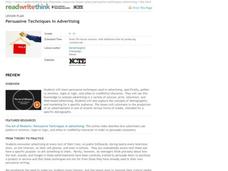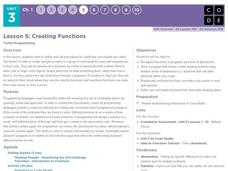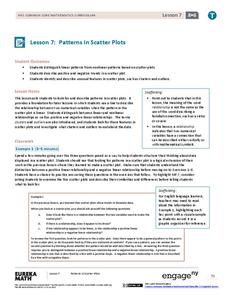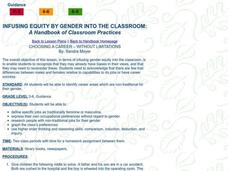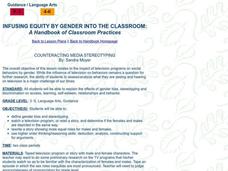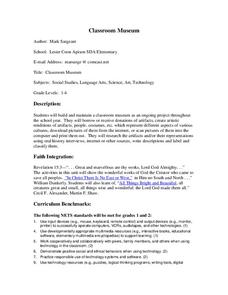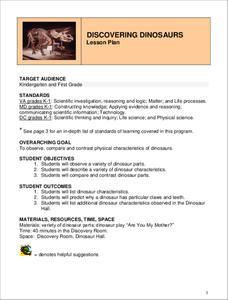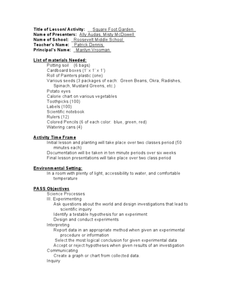ReadWriteThink
Persuasive Techniques in Advertising
Help your 21st century learners develop their media smarts with this resource that has them examine the persuasive techniques advertisers use to influence specific demographics and then to use these techniques to craft their own ads.
Code.org
Creating Functions
Quit repeating yourself ... you can make this simpler! Rather than repeating the same set of code over and over, class members learn to build and call functions in a series of challenges in App Lab. In the end, they combine functions to...
Bowland
Fruit Pies
Scholars use formulas for the area of a circle and the area of a rectangle to determine the number of pies a baker can make from a particular area of dough. They must also take into account rolling the remaining dough into a new sheet.
EngageNY
Patterns in Scatter Plots
Class members investigate relationships between two variables in the seventh installment of a 16-part module that teaches scholars how to find and describe patterns in scatter plots. Young mathematicians consider linear/nonlinear...
University of Minnesota
Dendritic Spines Lab
This is your brain on drugs ... literally! Your neuroscientists-in-training examine the evidence of drug use on the human brain and how neurons change their connectivity when altered by drugs. They then work together to create testing...
NASA
Development of a Model: Analyzing Elemental Abundance
How do scientists identify which elements originate from meteorites? Scholars learn about a sample of material found in a remote location, analyzing the sample to determine if it might be from Earth or not. They study elements, isotopes,...
University of North Carolina
Philosophy
Philosophers ask some of life's biggest questions about the nature of mankind, existence, and time, so what's it like to study the subject? A handout outlines different types of philosophy assignments common in college-level courses. The...
Curated OER
What Does My Bacteria Look Like?
Students identify Gram positive and Gram negative bacteria using staining techniques. Students research importance of identification of bacterial types in diagnosing bacterial diseases.
Curated OER
This Way with Hemingway
Students work as travel agents to plan an around-the-world trip to all of Hemingway's favorite world locations. They plan an itinerary which includes facets of the trip and record the information in their journals.
Curated OER
CHOOSING A CAREER - WITHOUT LIMITATIONS
Students identify career areas that are not traditional for their gender.
Curated OER
COUNTERACTING MEDIA STEREOTYPING
Learners explore the effects of gender bias, stereotyping, and discrimination.
Curated OER
Cross That Bridge
Students create paper bridges. In this geometry and architecture instructional activity, groups use legal paper and paper clips to design a bridge that will hold 100 pennies. Links to mini-lessons exploring stability of different...
Curated OER
Posters for a Charity
Young scholars examine Keith Haring's work. They create posters influenced by Haring that aim to inspire awareness and change.
Curated OER
Author Study
Students work collaboratively to create PowerPoint presentations on an author of their choice. This lesson is written for a first and third grade joint project with students pairing up across grade levels.
Curated OER
Classroom Museum
Students investigate various aspects of culture. They collect artifacts from various resources as an ongoing project throughout the school year. Students reflect upon the differences in cultures and subject areas as they conduct research...
Curated OER
Art and Artists: Multicultural Awareness and Appreciation Adaptation
Each student receives a piece of artwork representing a unique culture and artist. They work in with two other young scholars who have art representing a different culture and artist. They participate in a scavenger hunt to determine...
Illustrative Mathematics
Comparing Rational and Irrational Number
Algebra learners must know how to use rational numbers to approximate irrationals. This resource asks participants to decide which number is larger without using a calculator. It makes a great exercise to use as a five-minute transition...
Curated OER
Discovering Dinosaurs
Students investigate the physical characteristics of dinosaurs. They participate in a puppet show, take a field trip to a dinosaur museum, and compare/contrast dinosaur characteristics at the museum.
Utah Education Network (UEN)
It's All Just Similar to Me
Middle schoolers explore the concept of similar figures. In this similar figures lesson, pupils calculate scale factors of similar triangles. They find missing sides of triangles, and measure angles using protractors and measure sides of...
Curated OER
Exploring Ecosystems
Students examine the relationships between plants, animals, and the environment in ecosystems. They sort animal cards, collect natural materials from the schoolyard, and record an ecosystem web in the form of a poster.
Curated OER
Animal Coverings
Students compare and contrast the types of coverings found on animals. They identify a wide variety of animals in a museum room. They classify animals based on their coverings as well.
Curated OER
Identifying Minerals
Learners compare and constrast a wide variety of minerals and rocks. They test them for streak, luster, color and other characteristics. They view an exhibit and compare their answers to them.
Curated OER
Right to vote...in the wrong place
Students create a presentation for other class members or for a local citizens' group explaining how they can guard ensure voter rights. Students research the Ohio Secretary of State's stand on provisional voting rules.
Curated OER
Square Foot Garden
Students plant a garden and keep track of it. In this geometrical garden lesson plan, students collect data from their garden twice a week. They graph their finding and figure out how many square feet of growing space each person needs...


